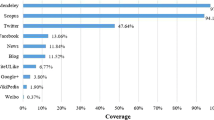Abstract
In this study, the accuracy of the Author ID (author identification) in the Scopus bibliographic database was evaluated. For this purpose, we adopted the KAKEN database as the source of “correct data”. KAKEN is an open database and is the biggest funding database in Japan because it manages all the information of the largest public fund for academic researchers. In the KAKEN database, each researcher has a unique Researcher Number, which must be used when a proposal or annual report is submitted to the database. Thus, the concordance between each researcher and the associated Researcher Number is checked automatically and constantly. For this reason, we used this number to evaluate the Scopus Author ID. After matching bibliographic records between Scopus and KAKEN, we calculated recall and precision of the Scopus Author ID for Japanese researchers. We found that recall and precision were around 98 and 99 % respectively. This result showed the Author ID, though not perfectly accurate in terms of individual identification, was reliable enough to be used as a new tool for bibliometrics. We hope that academic researchers outside Japan will also evaluate the accuracy of the Scopus Author ID as a tool to uniquely identify individual researchers.





Similar content being viewed by others
Notes
KAKEN is freely available at http://kaken.nii.ac.jp/en/.
The same description about weighting between precision and recall has been described by Moed et al. (2013).
Here, “researchers who have only one paper” refers to researchers who are connected by their Researcher Number in KAKEN and their Author ID in Scopus through only one paper. It does not mean they have produced only one paper in their research lives.
References
Beall, J. (2010). Metadata for name disambiguation and collocation. Future Internet, 2(1), 1–15. doi:10.3390/fi2010001.
Conchi, S., & Michels, C. (2014). Scientific mobility—An analysis of Germany, Austria, France and Great Britain. Fraunhofer ISI Discussion Papers, 41, 1–71.
Ferreira, A. A., Gonçalves, M. A., & Laender, A. (2012). A brief survey of automatic methods for author name disambiguation. ACM Sigmod Record, 41(2), 15–26. doi:10.1145/2350036.2350040.
Furukawa, T., Shirakawa, N., & Okuwada, K. (2011). Quantitative analysis of collaborative and mobility networks. Scientometrics, 87(3), 451–466. doi:10.1007/s11192-011-0360-7.
Ioannidis, J. P. A., Boyack, K. W., & Klavans, R. (2014). Estimates of the continuously publishing core in the scientific workforce. PLoS One, 9(7), e101698. doi:10.1371/journal.pone.0101698.
Jonkers, K., & Tijssen, R. (2008). Chinese researchers returning home: Impacts of international mobility on research collaboration and scientific productivity. Scientometrics, 77(2), 309–333.
Kurakawa, K., Takeda, H., Takaku, M., Aizawa, A., Shiozaki, R., Morimoto, S., & Uchijima, H. (2014). Researcher name resolver: Identifier management system for Japanese researchers. International Journal on Digital Libraries, 14(1–2), 39–58. doi:10.1007/s00799-014-0109-z.
Laudel, G. (2003). Studying the brain drain: Can bibliometric methods help? Scientometrics, 57(2), 215–237. doi:10.1023/A:1024137718393.
Moed, H. F., Aisati, M., & Plume, A. (2013). Studying scientific migration in Scopus. Scientometrics, 94(3), 929–942. doi:10.1007/s11192-012-0783-9.
Moed, H. F., & Halevi, G. (2014). A bibliometric approach to tracking international scientific migration. Scientometrics, 101(3), 1987–2001. doi:10.1007/s11192-014-1307-6.
Reijnhoudt, L., Costas, R., Noyons, E., Börner, K., & Scharnhorst, A. (2014). “Seed + expand”: A general methodology for detecting publication oeuvres of individual researchers. Scientometrics, 101(2), 1403–1417. doi:10.1007/s11192-014-1256-0.
Roberge, G., & Campbell, D. (2012). Canadian researchers migration analysis based on Scopus Author IDs. In 17th international conference on science and technology indicators (STI 2012), Montreal. http://sticonference.org/Proceedings/vol2/Roberge_Canadian_884.pdf.
Scopus. (2014). Scopus author identifier. http://help.scopus.com/Content/h_autsrch_intro.htm.
Smalheiser, N. R., & Torvik, V. I. (2009). Author name disambiguation. Annual Review of Information Science and Technology, 43(1), 1–43. doi:10.1002/aris.2009.1440430113.
Strotmann, A., & Zhao, D. (2012). Author name disambiguation: What difference does it make in author-based citation analysis? Journal of the American Society for Information Science and Technology, 63(9), 1820–1833. doi:10.1002/asi.22695.
Tran, H. N., Huynh, T., & Do, T. (2014). Author name disambiguation by using deep neural network. In Intelligent information and database systems (Vol. 8397, pp. 123–132). Cham: Springer. doi:10.1007/978-3-319-05476-6_13.
Yamashita, Y., & Yoshinaga, D. (2014). Influence of researchers’ international mobilities on publication: A comparison of highly cited and uncited papers. Scientometrics, 101(2), 1475–1489. doi:10.1007/s11192-014-1384-6.
Conflict of interest
The authors have no conflict of interests to declare.
Author information
Authors and Affiliations
Corresponding author
Rights and permissions
About this article
Cite this article
Kawashima, H., Tomizawa, H. Accuracy evaluation of Scopus Author ID based on the largest funding database in Japan. Scientometrics 103, 1061–1071 (2015). https://doi.org/10.1007/s11192-015-1580-z
Received:
Published:
Issue Date:
DOI: https://doi.org/10.1007/s11192-015-1580-z




